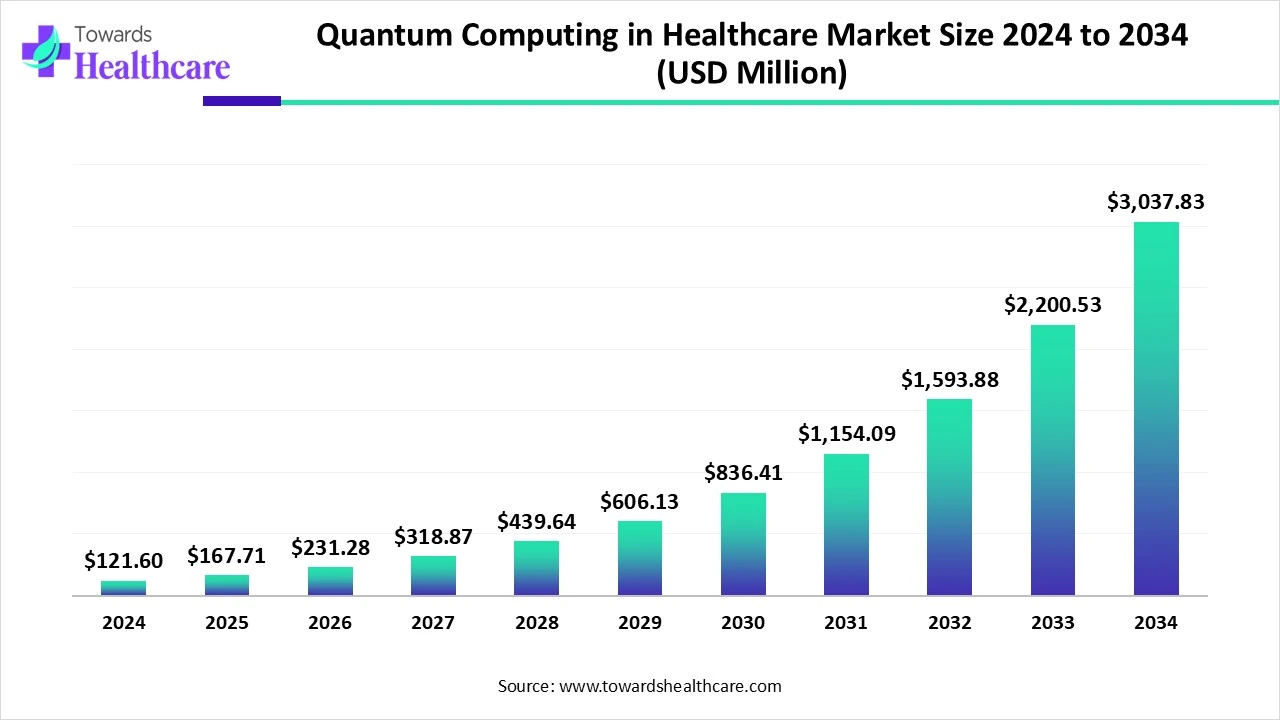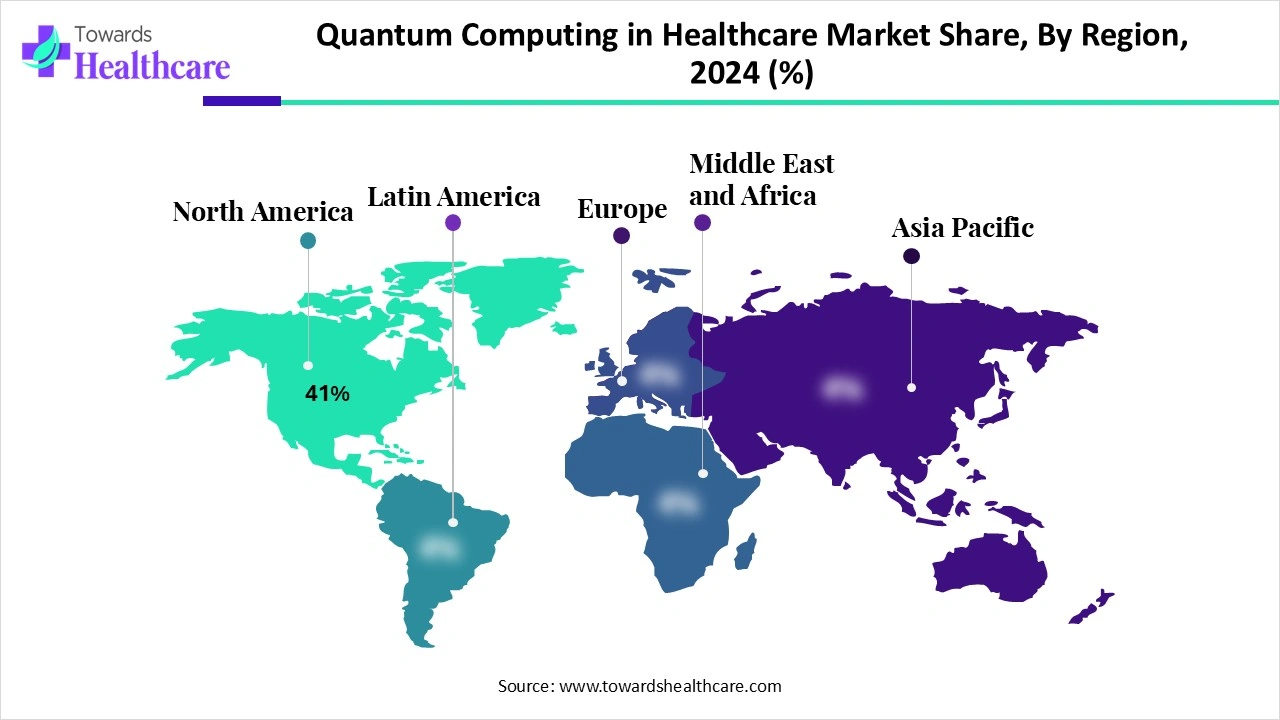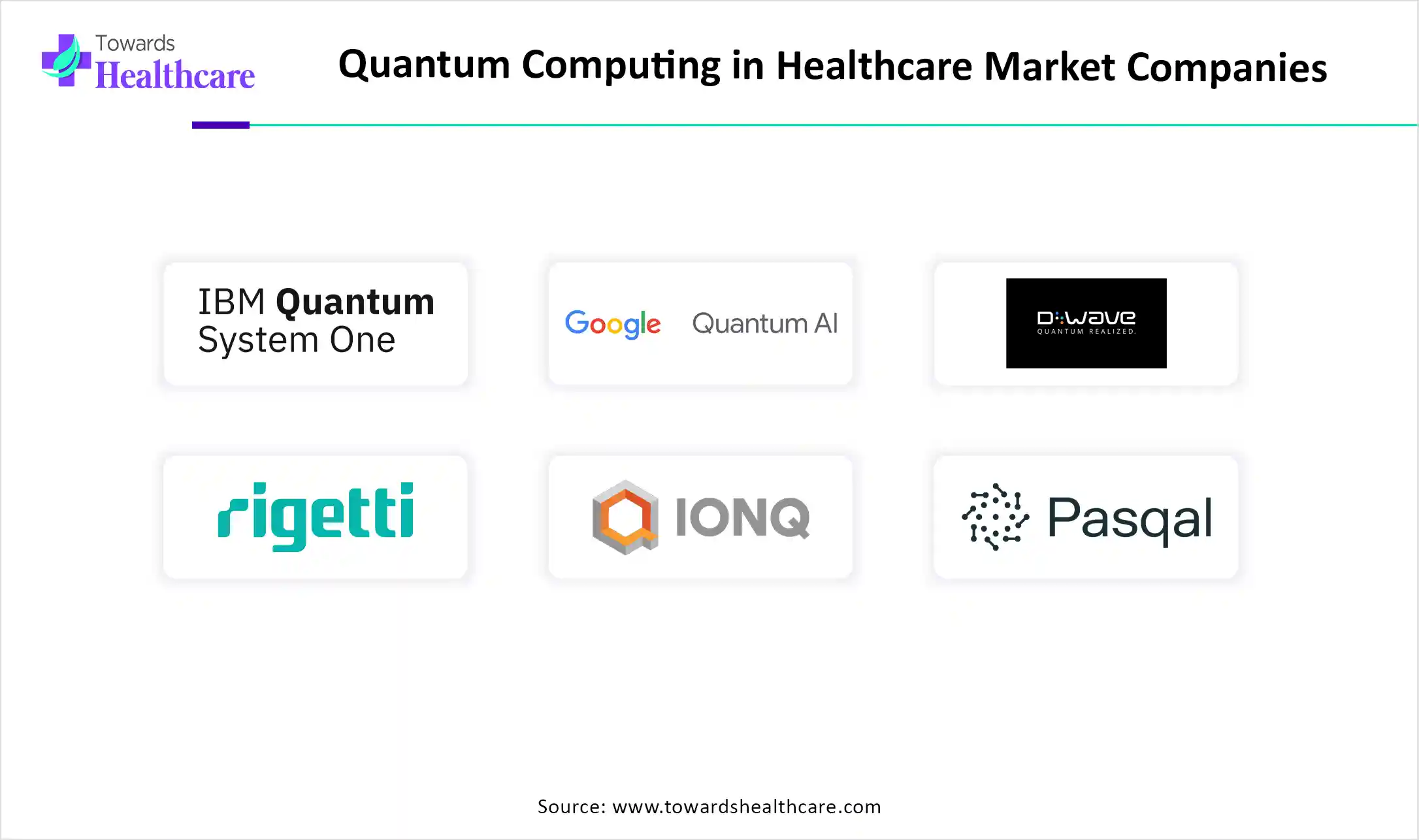January 2026

The global quantum computing in healthcare market size reached USD 121.6 million in 2024, grew to USD 167.71 million in 2025, and is projected to hit around USD 3037.83 million by 2034, expanding at a CAGR of 37.86% during the forecast period from 2025 to 2034.

Quantum computing remains a crucial part in transforming healthcare research and biomedical discovery. It helps to solve complex medical issues that are generally critical to resolve by traditional computers or even supercomputers. The major quantum computing in healthcare market players, like IBM, introduced the most advanced quantum computers that will accelerate scientific research and quantum technologies.
Quantum technologies hold immense potential in the pharmaceutical industry to redefine molecular structures and simulate medication interactions. One of the research papers published by the National Quantum Computing Center describes the remarkable potential of quantum computing in healthcare and pharmaceuticals. Based on quantum mechanics, these technologies can diagnose certain diseases with the help of quantum algorithms in a more accurate and quick manner. In recent times, Microsoft and Quantinuum have achieved success in reliable quantum computing by combining classical and quantum capabilities. Microsoft reported its investments in American leadership in quantum technology.
| Table | Scope |
| Market Size in 2025 | USD 167.71 Million |
| Projected Market Size in 2034 | USD 3037.83 Million |
| CAGR (2025 - 2034) | 37.86% |
| Leading Region | North America Share 41% |
| Market Segmentation | By Application, By Quantum Technology Type, By Service Type , By End User, By Region |
| Top Key Players | IBM Quantum, Google Quantum AI, D-Wave Systems, Rigetti Computing, Microsoft (Azure Quantum), IonQ, Pasqal, QC Ware, Zap Energy / PsiQuantum (investors), Zapata Computing, Cambridge Quantum (now Quantinuum), Classiq (hybrid circuit design), 1QBit, BosonQ Psi, GE Healthcare, Bayer / Boehringer Ingelheim / Roche, Alibaba Cloud, Amazon Braket (AWS), Tencent Quantum Lab, CQC2T |
The quantum computing in healthcare market spans the use of quantum computing technologies such as quantum annealing, gate-based quantum processors, and quantum-inspired algorithms for solving complex healthcare challenges. Applications include drug discovery (molecular simulation), genomics (read alignment, variant calling), medical imaging enhancement, optimization of clinical trial designs and logistics, and personalized treatment planning. Demand is driven by the exponentially growing data complexity in the life sciences, limitations of classical computing, and breakthroughs in quantum hardware and hybrid quantum-classical algorithms.
AI algorithms contribute to the analysis of a vast amount of data, such as data related to molecules, diseases, and clinical trials. Generative AI is helpful to researchers in designing new molecules with specific desired properties. AI helps in drug discovery and development in a smart and fast manner. It also assists in making treatments accessible to patients faster and developing drugs with few side effects.
What are the Major Drifts in Quantum Computing?
Quantum computing plays a pivotal role in enhancing medical technology and treatments. It is majorly involved in the interpretation of genetic data, public health surveillance, and optimization of clinical trials. Quantum science assists in biomedical research, medical imaging analysis, and personalized medicine. It accelerates drug discovery, enhances cybersecurity, and results in enhanced data processing.
What are the Potential Challenges in Healthcare?
The healthcare sector faces challenges in improving diagnostic accuracy, data management, and treatment efficacy. There are certain limitations associated with traditional computational methods in terms of linear scaling and processing capabilities. These limitations hinder their potential to manage and analyze the vast datasets in healthcare.
What is the Future of Quantum Computing in Healthcare Market?
Healthcare industries are employing several advanced technologies, such as diagnostic imaging tools like CT scanners and MRI, electronic health records, and complex bioinformatics systems for genomics. Quantum computing holds immense potential to reduce time and costs associated with new drug development processes. It enhances molecular interactions, drug discovery, and diagnostic processes. Healthcare providers are adopting personalized treatment approaches through data privacy and security.
The drug discovery & molecular modeling segment dominates the quantum computing in healthcare market in 2024, owing to the development of new therapies. The rising trend of precision medicine and increased focus on reducing the burden of diseases drive cutting-edge technologies. Drug discovery leads to the prevention or treatment of various diseases like diabetes, cancer, and infectious diseases.
The personalized medicine & treatment optimization segment is expected to grow at the fastest CAGR in the quantum computing in healthcare market during the forecast period due to the effectiveness of various treatments. The integration of genetic testing, molecular profiling, and many other technologies aims to reduce trial-and-error approaches during treatments. These strategies result in reduced adverse effects while delivering proactive and preventive care.
The quantum annealing segment dominated the quantum computing in healthcare market in 2024, owing to the potential of these technologies in managing complex tasks efficiently. Quantum annealing is specifically applicable and useful in drug discovery, molecular simulations, logistics, material science, and many other fields. This technology is accessible and helpful to researchers and businesses to explore emerging trends and drive innovations.
The quantum-inspired/HPC hybrid systems segment is expected to grow at the fastest CAGR in the quantum computing in healthcare market during the forecast period due to the improved performance of these tools and techniques for tedious optimization issues. The applications of quantum principles without requiring quantum hardware drive the adoption of these systems. These systems offer enhanced efficiency in machine learning and simulation.
The quantum software & algorithms segment dominates the quantum computing in healthcare market in 2024, owing to the revolution in drug discovery and material science. These technological advancements assist with enhanced data security and sustainable solutions. They help to optimize various operations across finance, logistics, and manufacturing.
The custom quantum R&D services segment is expected to grow at the fastest CAGR in the quantum computing in healthcare market during the forecast period due to the availability of customized services for complex problems. These services help to allocate efficient resources and reduce operational costs. They facilitate improved fraud detection and enhanced risk analysis, and management.
The pharmaceutical & biotech companies segment dominated the quantum computing in healthcare market in 2024, owing to accurate and fast molecular simulations that drive improved drug discovery and development. Biopharmaceutical companies are experiencing improved manufacturing and supply chains and adopting the rising trend of personalized medicine. Cutting-edge computational technologies offer enhanced data security and privacy to biopharmaceutical firms.
The technology vendors/startups segment is expected to grow at the fastest CAGR in the quantum computing in healthcare market during the forecast period due to the benefits of quantum computational technologies in terms of efficient problem-solving and excellent innovations. The increased accessibility to cloud-based quantum computing platforms allows the leading companies to expand their businesses. The innovative technologies are widely applicable across various sectors and purposes, such as optimization of business operations, cybersecurity, material science, drug discovery, etc.

North America dominated the quantum computing in healthcare market share 41% in 2024, owing to advancements in drug discovery and development and a strong R&D ecosystem. In January 2025, HCLTech and Microsoft reported the expansion of their strategic partnership to revolutionize contact centers with cloud-based solutions and generative AI. The Defense Advanced Research Projects Agency selected Microsoft to advance the development of utility-scale quantum computers through the renewal of funding from the U.S. government to Microsoft Azure. Furthermore, Microsoft and 1910 Genetics made a partnership to equip R&D productivity for the pharmaceutical industry.
In March 2024, NVIDIA, the major cloud provider, presented its cloud quantum computer simulation microservices to assist scientists in improving quantum computing and algorithm research through its quantum simulation platform. The House Science Committee planned to hold a hearing for the assessment of the National Quantum Initiative in May 2025, which will advance the U.S. in quantum technology. The U.S. House Committee on Science, Space, and Technology reported that the National Quantum Initiative supports the leadership of the U.S. in quantum technology.
The Government of Canada focuses on accelerating the development of Canadian quantum computing software, hardware, and algorithms that will support Canada’s national quantum strategy. In September 2024, Fujitsu Research highlighted the recent technological advancements in quantum error correction, diamond spin qubits, and qubit technology at the IEEE Quantum Week in Montreal, Canada. The Quantum Algorithms Institute, situated in British Columbia, Canada, is officially ordered to support the economic growth of quantum science in British Columbia.
Asia Pacific is expected to grow at the fastest CAGR in the quantum computing in healthcare market during the forecast period due to the collaborative environment for the expansion of the healthcare sector. According to IBM, quantum computing assists in accelerating India’s path to Viksit Bharat in 2047. In November 2024, SDT Inc., in partnership with MIMOS Technology Solutions in Malaysia, announced the launch of the first quantum computing center in Malaysia to provide high-performance and secure computing solutions through quantum communication and ultra-precision electronics. In December 2024, China reported the launch of the Hefei Institute of Quantum Computing and Data Medicine to integrate quantum computing with data-driven medicine. Novo Nordisk makes efforts to advance quantum computing for outstanding improvements in life sciences and healthcare.
In May 2024, Tata Consultancy Services made a strategic partnership with the Indian Institute of Technology, Bombay, to innovate the first quantum diamond microchip imager in India. Moreover, the India-UK partnership introduced the technology security initiative to accelerate economic growth in India and the United Kingdom in July 2025. These efforts aim to ensure telecommunications security and collaborations across major areas such as quantum computing, artificial intelligence, health technology, semiconductors, and critical minerals.
In July 2024, the Government of Singapore announced an investment of US$300 million to fuel research and development in quantum technologies over the next five years. Furthermore, the National Quantum Office of Singapore, Agency for Science, Technology and Research, National Supercomputing Center, National University of Singapore, and Quantinuum signed an MoU to make the advanced quantum computer of Quantinuum more accessible with the help of computational technology. In October 2024, Toshiba reported its commitment to a quantum-safe Singapore and to boost quantum technological innovations in Singapore through the expansion of Southeast Asia.
Europe is expected to grow at a notable rate in the quantum computing in healthcare market in 2024. This regional growth is attributed to various government initiatives and the adoption of cutting-edge technologies. In September 2024, the European Union announced the launch of an approximately $73 million funding call to accelerate quantum chip technology by driving semiconductor innovations and technological advancements. The European Commission introduced the Quantum Europe strategy in July 2025, which aims to transform Europe into a quantum hub by 2030. The first IBM quantum data center in Europe encompasses high-performance quantum systems.
In October 2024, European government officials and Europe-based global enterprises inaugurated the first IBM quantum data center situated outside the U.S. that will expand the fleet management system and utility-scale quantum system.
Various efforts have been made to make France one of the global leaders in quantum technology. Quantum technologies are becoming key strategic areas for France and most European countries. France is the prominent choice of researchers dealing with AI, quantum cybersecurity, and computer science.

In July 2024, Dr. Subodh Kulkarni, CEO of Rigetti Computing, announced that Quanta’s investment in Rigetti will strengthen the company’s leadership in the flourishing quantum computing market. He also proclaimed that Quanta, as the world’s leading notebook/server manufacturer with $43 billion in annual sales, will support Rigetti to remain at the forefront of the quantum computing industry.
By Application
By Quantum Technology Type
By Service Type
By End User
By Region
January 2026
January 2026
January 2026
January 2026